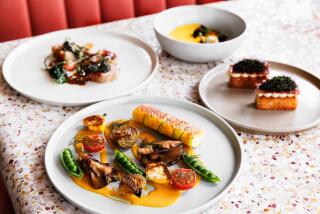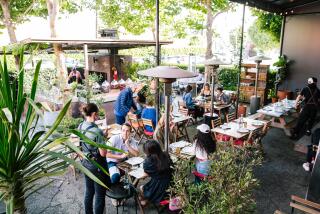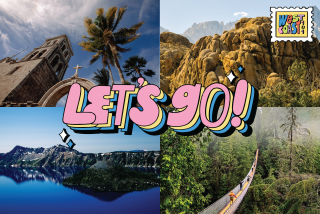Crown Jewel Shines in Patagonian Paradise
- Share via
BARILOCHE, Argentina — Think of this country and your mind flashes images of gauchos riding herd on cattle that produce gargantuan steaks, and the sophistication of its capital, Buenos Aires. But all that’s up north.
Down south, stretching 1,200 miles from the Colorado River to Tierra del Fuego, lies Patagonia, a belt of land from ocean to ocean that seems to cram all the topography of a geography book into its scenic confines: snow-capped mountains and glaciers; tranquil alpine lakes and tumbling streams; miles of boring flatland; forests so green and thick that they appear impenetrable.
Bariloche, hard by the Chilean border, is the crown jewel of Patagonia, reigning over the area’s other gems by dint of its size, dazzling setting in foothills of the Andes and year-round popularity with skiers, fishermen and nature lovers.
Argentina’s population is a rich mix of Spanish, Italian, Swiss, German, native Indian and others, but Bariloche appears to have been conceived and built by Bavarian, Tirolian and Swiss emigres bent on transferring the distinct aura of their homelands.
Here to there: Aerolineas Argentinas, Avianca and Pan Am fly to Buenos Aires; Varig, Eastern and Empresa Ecutoriana with changes. Take Aerolineas Argentinas or Austral on to Bariloche. Cabs only for the 10-mile run into town, about $10.
How long/how much? Skiers and fishermen probably won’t settle for less than a week, others as long as they can spare for the town and environs, three-day minimum. Prices for dining low, lodging low to moderate.
A few fast facts: The peso was replaced not long ago by the austral, recently valued at $1.10 U.S., but ask merchants for the “parallel” rate, widely accepted, which is about 5% more favorable. High winter season July-August, fishing mid-November until mid-April, autumn around April-May a colorful spectacle indeed.
Getting settled in: Sol Bariloche (Mitre 212; $49 double) is at center of the large village, enormous lobby decorated with ski graphics and flowers, contemporary bedrooms with wood paneling, many with balconies overlooking Nahuel Huapi Lake. Full dining, bar, sauna.
Hotel Residencial (Libertad 175; $28 double B&B; in summer, $28 per person, winters) has only 14 rooms, a cozy house with living room-like lobby filled with plants and flowers. A few blocks up from lake, tiny garden that’s all charm, wooden floors that shine so that they must be polished hourly. Breakfast only, but still our favorite for the friendliness and personal attention.
Tres Reyes (Av. 12 de Octubre 135; $32 low season to $80 high, double with continental or American breakfasts) sits right on the lake, Belgian-owned and stocked liberally with antiques from the homeland. Huge public areas comfortably furnished with marvelous red leather chairs, fireplaces, Oriental rugs. Dining room has views of lake and we would recommend taking half-pension for the excellent food, friendly prices and popularity with locals.
Regional food and drink: German and Swiss specialties abound on menus: deer, wild boar, smoked venison and ham prepared in an alpine manner, plus fondues and extravagant pastries. The last are often topped with dulce de leche , a thick, sweet sauce also used as filling for crepes.
Argentina’s legendary steaks and chops have not been forgotten in these parts. They’re always available and at much better prices than in Buenos Aires.
You can get a good Argentine vin ordinaire for about $1.25 a bottle; one of the best reds to go with those steaks has the rather strange name of Aberdeen Angus.
Moderate-cost dining: On the edge of town you’ll find a great Argentine-Spanish roadhouse, La Posta del Rio, which surely serves Bariloche’s best barbecue. Cavernous open fireplaces grill steaks, chops and sausages as the pungent smoke curls upward, also an open kitchen where they’re chopping mushrooms, tomatoes, onions and potatoes to garnish your order.
Bowls of bread, butter and blue cheese are fixtures on each table, filled immediately as they empty. Dine like a bandit at this rustic place on filet mignon for $2.75, sirloin the same, seven kinds of barbecued meat on the parrillado plate at $5.50.
Bellevue (Casilla de Correo 62) is a German-owned cottage in a rose garden, small, with unsurpassed views of the lake and mountains. This one is really only a salon de te serving light fare but noted for its scones, pastries and gigantic trays of delicious desserts.
Back in town we have Le Chalet (20 de Febrero 526), this time Swiss-owned with cheery farmhouse decor. Fondue, raclette, Swiss salad of Gruyere and country sausage, plus steak served Swiss-style. All main courses about $5.
Going first-class: A Moorish-style place reminiscent of a parador, El Casco (Ruta a Llao-Llao; $146 to $160 double, with half-pension all year). You’ll feel like royalty at this marvelous hotel on the lake, with its own pier for fishermen anxious to get aboard and start pulling them in.
Majestic bedrooms, a large, beamed communal room where you’re served smoked reindeer and local cheeses with your drink before dinner, sauna, broad terraces leading down to the lake, food vaguely continental.
On your own: If visions of boating a 40-pound salmon bring out the Izaak Walton in you, get your plane ticket and visa right now. Brook, speckled, brown and rainbow trout also cloud the waters in great numbers. Good skiers gravitate here for the marvelous slopes of nearby Cerro Catedral, covered with wildflowers in summer.
An absolute must is the launch day-trip to Victoria Island with a stop at Quetrihue Peninsula to see the famous Arraynes Forest. These fawn-colored, myrtle-like trees with white blossoms create a feeling of total enchantment. Another day could easily be spent just driving around to absorb the wonders of mountain scenery, lakes, rock formations, falls and caves.
Back to town to shop for inexpensive handmade sweaters, or delicious chocolates at $3 a pound. A sweet-tooth Shangri-La.
For more information: Argentina has no tourist offices in this country, but you may call Aerolineas Argentinas toll-free at (800) 327-0276, or write (9 Rockefeller Plaza, New York 10020) for a booklet on the country including Bariloche and Patagonia with maps, hotels, tips on dining, shopping, skiing and other outdoor activities.
More to Read
Sign up for The Wild
We’ll help you find the best places to hike, bike and run, as well as the perfect silent spots for meditation and yoga.
You may occasionally receive promotional content from the Los Angeles Times.






